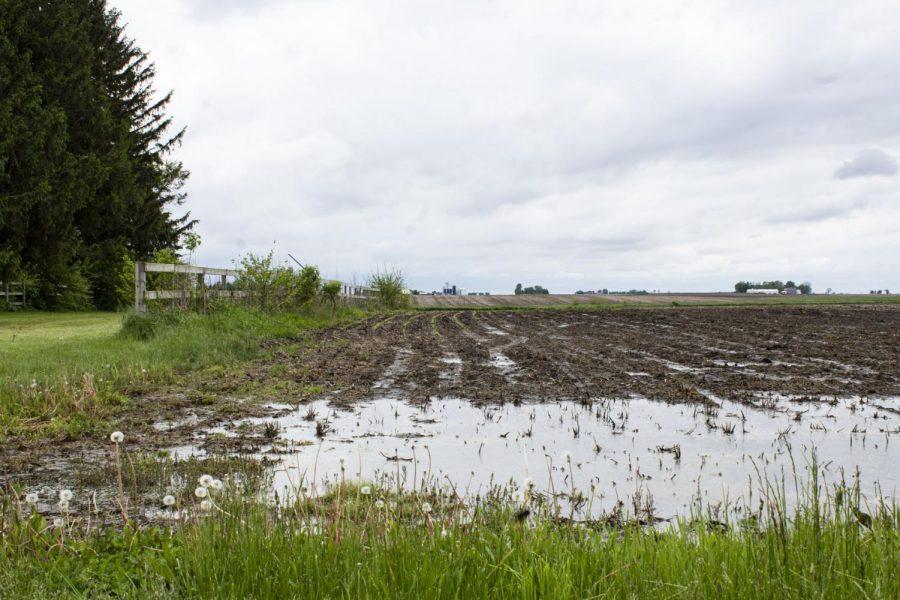DeKalb farmers face planting crisis amid severe weather
May 29, 2019
DeKALB — Mark Tuttle, president of the DeKalb County Farm Bureau and farm owner, said his kids spotted a mallard hen and eight of her children floating on a rainwater pond in their corn fields. For the entire month of May, Tuttle has not been able to plant any crop.
“I’ve been farming 40 years, and not once in my life have I not had a tractor in the fields through the whole month of May,” he said.
DeKalb county — and most of the Midwest — faces an agriculture crisis. DeKalb has received more than six inches of rain this month, which is more than three inches above the normal amount, according to National Weather Service data. In some of the farmlands south of the city, the data shows a more than four-inch departure from normal.
Tuttle said nationwide, 58% of the corn crop has been planted. That leaves 35 million acres unplanted — and that’s just corn. More than double that is the total amount of cropland that is unplanted, he said.
Greg Millburg, manager of the DeKalb County Farm Bureau, said Illinois has 20% of its corn acreage planted, as of May 26. He said the five-year average for this time of year is 86%.
Lower corn yield will have a significant impact on the county’s economy: 88% of the county is farmland, and corn is its primary commodity. Further, a low yield will have a ripple effect on other related products.
“We feed a lot of hogs [with corn] in DeKalb county,” he said. “If we don’t have corn, they’ll cut back on the hog herds, and pretty soon the price of pork in stores will go up.”
He said the same will happen with corn-fed cattle and the price of beef, and the same will happen with chickens.
Not just farmers and consumers will be hit. Tuttle said retailers selling farmers’ products will have fewer sales if there’s less to sell, and the support jobs that rely on agriculture production will be in lower demand.
Farmers have options in this kind of crisis, Millburg said.
One option is to plant what you can. The farmer gets a low crop yield, but is eligible for federal Market Facilitation Program payments. The USDA started the program last year to help farmers deal with the economic impact of trade talks and tariffs, and it announced May 23 the second round of funding for this season.
Another option is to leave the fields unplanted. Millburg called this the prevent plant option, which is a type of insurance claim made when field conditions made planting impossible. The USDA only pays farmers for crops planted, meaning prevent-plant claims and USDA funding are incompatible.
He said the compensation is “not near” what the farmer would get during an average planting season.
{{tncms-inline content=”<p>"We feed a lot of hogs [with corn] in DeKalb county. If we don&rsquo;t have corn, they&rsquo;ll cut back on the hog herds, and pretty soon the price of pork in stores will go up."</p>” id=”b45a5c68-6045-4cf0-9d28-3e88793a009c” style-type=”quote” title=”Tuttle” type=”relcontent”}}
Tuttle said his farm will be trying to plant as much corn as it can, even though the USDA has not announced how much the Market Facilitation Program will pay.
Federal payments are a what-if, he said, and insurance is a guarantee. But insurance will only help the farmer who couldn’t produce — other agriculture business will be left fallow.
Millburg said June 5 is the deadline to plant corn or make a prevent-plant claim. Tuttle said if it rains again next week, he won’t be able to plant.
The National Weather Service forecasts rain tonight and tomorrow and a chance of rain Friday night into Saturday.
{{tncms-inline content=”<p>Farmers have started a <span style="text-decoration: underline;"><a href="https://twitter.com/hashtag/noplant19?ref_src=twsrc%5Egoogle%7Ctwcamp%5Eserp%7Ctwgr%5Ehashtag" target="_blank">#NoPlant19</a></span> trend on twitter, documenting difficulties across the Midwest.</p>” id=”7d399b64-9c6c-4add-8308-6212c8ffa8bf” style-type=”refer” title=”More Coverage” type=”relcontent”}}







